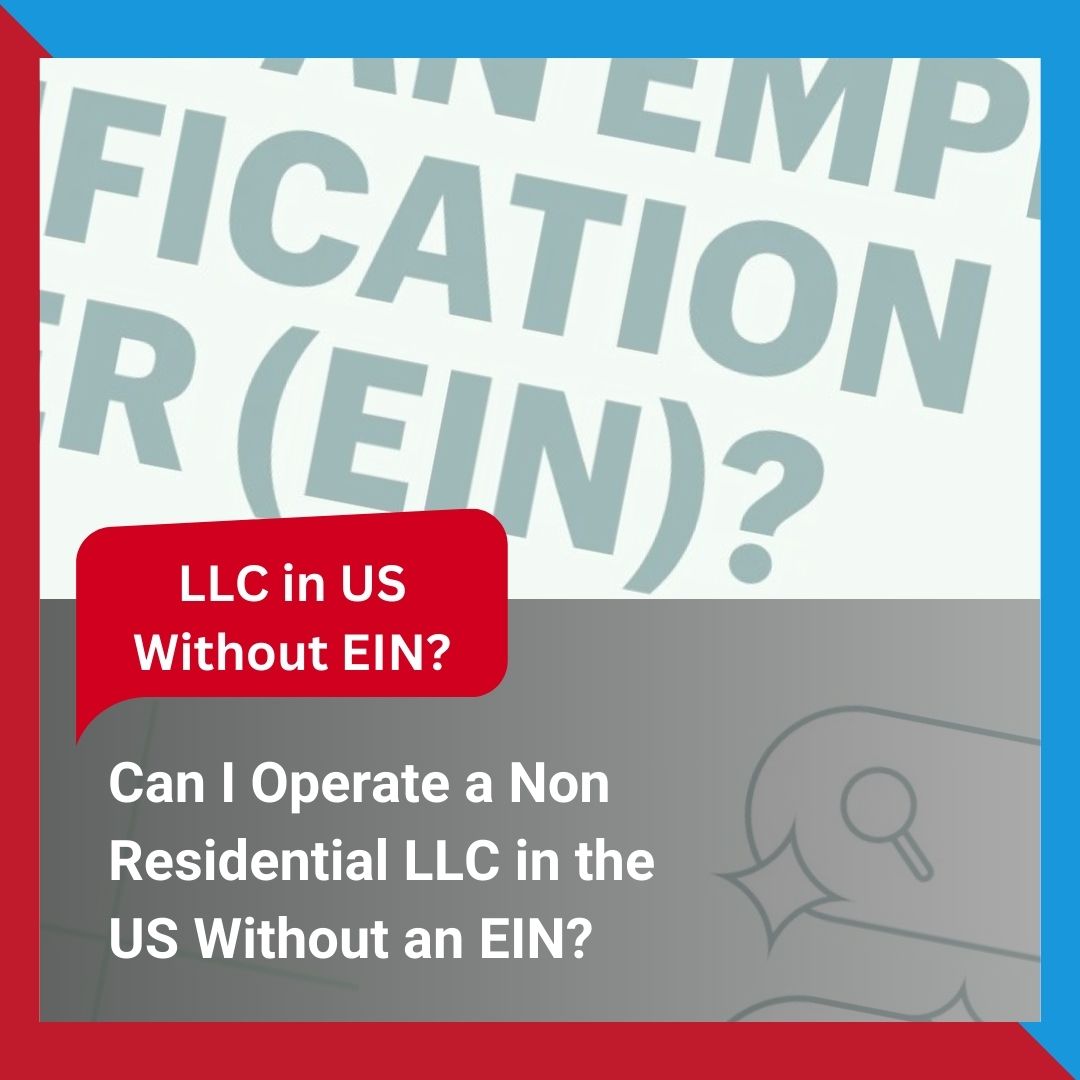Table of Contents
Operating a non-residential Limited Liability Company (LLC) in the United States presents various challenges and considerations, one of which is the requirement for an Employer Identification Number (EIN).
In this comprehensive guide, we’ll explore whether it’s possible to operate a non-residential LLC in the US without an EIN. We’ll delve into the disadvantages of not having an EIN, the limitations it can cause while operating an LLC, and provide expert insights to help you navigate this aspect of business ownership.
Disadvantages of Operate an LLC in the US Without an EIN
1. Inability to Open a Business Bank Account:
One of the primary disadvantages of not having an EIN for your non-residential LLC is the inability to open a business bank account. Most financial institutions require an EIN to open a business account, as it serves as a unique identifier for tax and banking purposes. Without a business bank account, it can be challenging to manage your LLC’s finances and separate personal and business expenses.
2. Limited Access to Business Services:
Many business services and vendors require an EIN to establish accounts or enter into contracts with your LLC. Without an EIN, you may encounter difficulties in accessing essential services such as obtaining business insurance, securing business credit or loans, and signing up for utilities or other necessary services for your operations.
3. Tax Compliance Issues:
An EIN is necessary for tax compliance purposes, including filing tax returns, reporting income, and paying taxes. Without an EIN, your non-residential LLC may face challenges in meeting its tax obligations, leading to potential penalties, fines, and legal consequences. Additionally, without an EIN, your LLC may be unable to claim tax deductions or credits available to businesses.
4. Legal and Regulatory Compliance:
Operating an LLC without an EIN may result in non-compliance with state and federal regulations. Certain states require LLCs to have an EIN for various business activities, and failing to obtain one can lead to administrative penalties, loss of good standing status, and other legal repercussions. Additionally, not having an EIN may hinder your ability to apply for necessary licenses or permits for your business operation.

Limitations of Operating a Non-Residential LLC Without an EIN
1. Restricted Business Growth:
Operating a non-residential LLC without an EIN can restrict your business’s growth potential. Without access to essential financial services and resources, your LLC may struggle to expand its operations, enter new markets, or take advantage of growth opportunities.
2. Increased Personal Liability:
Without the protection of a separate legal entity provided by an EIN, the personal assets of the LLC’s owners may be at risk in the event of legal disputes or financial liabilities. Operating without an EIN can expose owners to personal liability for the debts and obligations of the LLC, potentially jeopardizing their financial security.
3. Limited Credibility and Professionalism:
Having an EIN lends credibility and professionalism to your non-residential LLC. It signals to clients, customers, and business partners that your LLC is a legitimate entity recognized by the IRS and compliant with tax and regulatory requirements. Operating without an EIN may diminish your LLC’s perceived credibility and professionalism in the eyes of stakeholders.

Expert Insights and Recommendations
While it may be possible to operate a non-residential LLC in the US without an EIN, the disadvantages and limitations outlined above highlight the importance of obtaining one.
As an expert, it’s recommended to prioritize compliance with state and federal regulations and take proactive steps to complete the EIN application process. for your LLC. Doing so will not only ensure legal and regulatory compliance but also facilitate smoother operations, business growth, and protection of personal assets.
Frequently Asked Questions (FAQs)
1. Can a non-residential LLC operate under the owner’s Social Security Number (SSN) instead of an EIN?
Yes, non-residents can apply for an EIN for their non-residential LLC by following the same application process as US residents. The application can be completed online through the IRS website, and no additional documentation is required.
2. How long does it take to obtain an EIN for a non-residential LLC?
You can typically obtain an EIN for your non-residential LLC immediately by applying online through the IRS website. The process is simple and free of charge, allowing you to receive your EIN instantly upon completion of the online application.
3. Are there any exceptions or circumstances where a non-residential LLC may not need an EIN?
While most non-residential LLCs require an EIN for tax and regulatory purposes, there may be exceptions or specific circumstances where an EIN is not necessary. It’s recommended to consult with a legal or tax advisor to determine the specific requirements for your LLC based on its unique circumstances and activities.
4. Can a non-residential LLC apply for an EIN if the owner is a non-US resident?
Yes, non-residents can apply for an EIN for their non-residential LLC by following the same application process as US residents. The application can be completed online through the IRS website, and no additional documentation is required.
Conclusion
While it may be tempting to operate a non-residential LLC in the US without an EIN, the disadvantages and limitations outlined in this guide underscore the importance of obtaining one. From opening a business bank account to ensuring tax compliance and protecting personal assets, an EIN plays a crucial role in the success and legitimacy of your LLC.
As an expert, it’s recommended to prioritize compliance and take proactive steps to secure an EIN for your non-residential LLC. If you need assistance in registering your business you can contact us today. By doing so, you’ll position your business for growth, credibility, and long-term success in the competitive business landscape of the United States.

